Writers' Rooms
Over the past few months, we've missed the daily interaction with our colleagues and friends, and the motivation and insight they bring to life at the Centre. And so, we have begun to ask some of them to show us their writing rooms, and tell us what they are working on.
For the full experience, we've compiled a playlist with all the music mentioned in the Writers' Rooms series. Press play, and imagine strolling down a long corridor taking in some very different soundtracks as you go. Listen here.
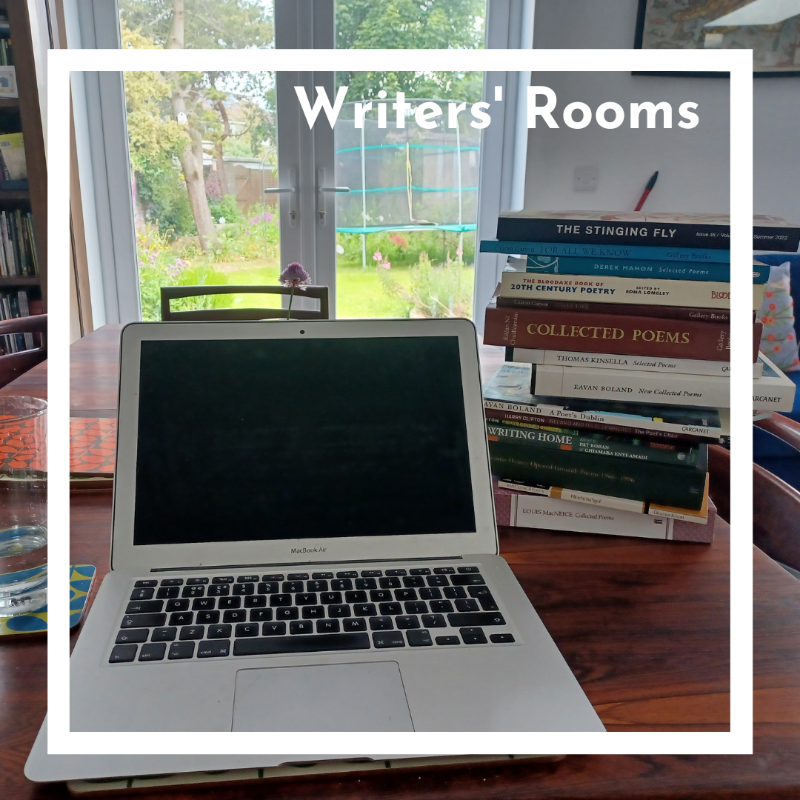
Poet and 2022 First Collection Poetry Prize Guest Judge, Jessica Traynor, invites us to her writing space for an insight into her ongoing projects and the comfort of poetry you can go back to time and again.
Jessica Traynor is a poet, essayist and librettist. She is a Creative Fellow of UCD, and her third collection, Pit Lullabies, was published by Bloodaxe Books in March 2022 and is a Poetry Book Society Recommendation.
Where are you?
Right now, working from my kitchen table. Although there is an office in our house, it's been taken over by my partner during lockdown. I joke about him having stolen my space (I'm not really joking), but in fairness I tend to wander around the house a lot and pitch up in different places according to my mood, so we have decided the proper desk space would mostly be wasted on me.
What are you working on?
I am currently assembling a pile of books for a series of five lectures I'll be giving on Irish poetry as adjunct lecturer for the University of Iowa Creative Writing Programme this June. Five lectures, and all of Irish Poetry to cover - I'm hoping to get away with a contemporary focus. So far, I just have The Pile. But by some alchemy The Pile will become five inspiring lectures.
What’s that over there?
That's a very messy bookshelf, and that's a chive flower in a glass of water. The behemoth outside is the trampoline which our local magpies use as a litter tray.
What’s that sound?
It's Claire Byrne applying her boundless scepticism to the DAA's plan to sort out the queues at Dublin airport on RTE Radio One.
What are you reading/watching these days?
I'm reading Wong May at the moment and trying to pay very close attention to the movements within the poems, which are clipped and yet somehow expansive at the same time.
What might you revisit in times of crisis or uncertainty?
In times of emergency I tend to go back to Derek Mahon. There's something about revisiting those poems I read in secondary school that reminds me of why I first decided to try to write poetry myself. I also dip in and out of Mary Ruefle, to reinforce a principle I try to live by in my own work - that the most serious ideas are best approached without earnestness.
Best advice for writers?
The secret is to just keep going.
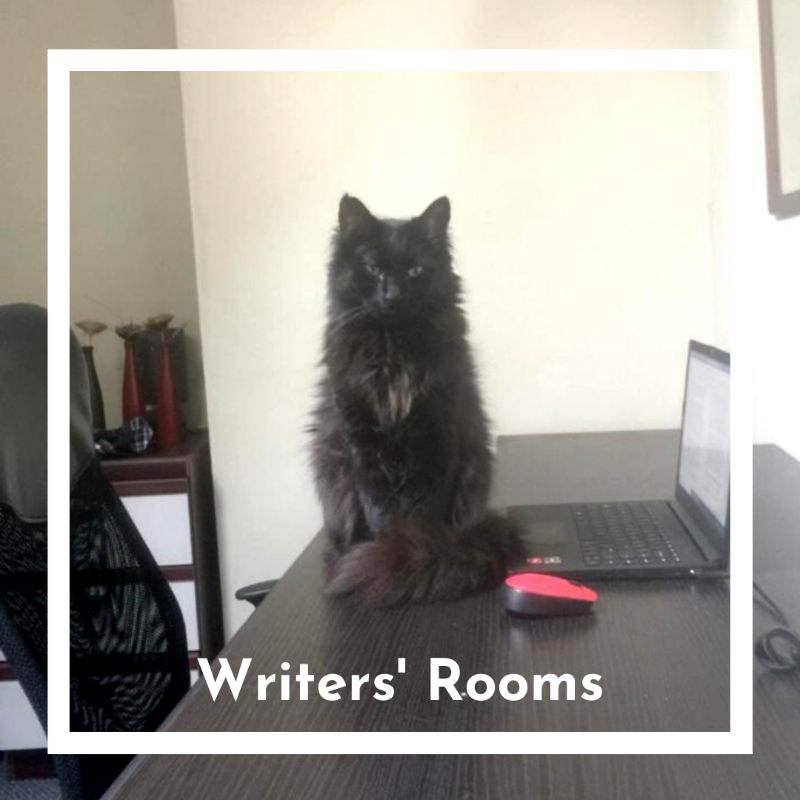
Poet and PhD student, Andrew Rahal, invites us to his cat's desk/writing room for an insight into the creative life of a toddler, (and the poet who raises him).
Andrew is the host of Write Night, a weekly writing group based in the Seamus Heaney Centre. While the real world event is on hold, in a weekly Write Night email, our host Andrew shares insights and approaches to his own writing practice, drawing on diverse sources from Susan Sontag to Dr Seuss.
Where are you?
At my cat’s desk in the top floor bedroom of our mid-terrace pet and toddler palace in East Belfast.
What are you working on?
I am working on a full-length poetry collection, and some critical writing on Layli Long Soldier’s book Whereas. I am also proofing a chapbook that is coming out this fall with Seven Kitchens Press.
What’s that over there?
Well… Rufio (the cat) should be ‘over there’ but he would rather sit here and help me forget about work, writing, and general responsibilities. Off camera is whatever I cleared off the desk to make it decent: lumps of dried playdough, a bowl of old cereal and congealed milk, drift piles of nappies and random clothes, arts, crafts, important-looking papers, four books, two binders of PhD stuff, a half-eaten apple I just discovered under the desk…
What’s that sound?
Oh nothing. Don’t panic. It’s just my son tossing his toys down the flight of stairs or my son repeatedly slamming his body against the shower door because he’s just discovered the new sound or my son dragging a chair to the pantry for the sleeve of Oreos that I thought I hid, but whatever. And that's our lab/shepherd mix barking at every pedestrian that passes by the window, or the cat meowing at me to get out of his room and let him go back to sleep. And that is the light and steady traffic on Beersbridge Road which, when it comes through the ruckus, makes for some soothing background noise. It is quite lovely.
How does isolation help or hinder you?
Things are great! Since creche sent him home at approximately 8:42 am on March 23, 2020 things have been great. Just GREAT.
Time for a break…?
I’ll take the dog for a skate walk to one of the fields along the greenway and throw the ball for him. We still have obsessions to maintain.
What are you reading/watching these days?
BaaaaaaBy SHARK! Do-do-do-Do-do-do.
I am watching my son watch Octonauts right now. I can never pick a show or a movie. I check surf forecasts for the north and west coasts of Ireland two or three times a day.
What might you revisit in times of crisis or uncertainty?
The coast if a swell is coming.
Baby SHARK! Do-do-do-Do-do-do.
Best advice for writers?
Christopher Walken said it best: “more cowbell.”
Baby Shark! Do-do-do-Do-do-do. Baby Shark.

Writer, actor, educator, and the recent Bookfinders Chair of Creative Writing, Sheila McWade, invites us into BOTH of her writing rooms for (too much) coffee and canine therapy. We're talking about the best female protagonists, novels that make us collapse with joy, and life-affirming cinema.
Where are you?
At the Belfast desk, in the attic, facing the window, near the top of the trees, next stop the sky … I also have a desk in North Antrim where curious cows peer at me over the hedge.
What are you working on?
Stories, short and long. Novel No. 2 is screaming at me. And I’ll be returning imminently to a couple of drafted research articles on novelist Janet McNeill.
What’s that over there?
Out the window is the city of Belfast, resplendently laid out between her rolling Antrim and Down hills. I can see Harland & Wolff’s two yellow cranes and Stormont in the distance. Over there on the desk is my favourite childhood teddy bear, a precious possession since babyhood gifted to me by my favourite uncle. Ted makes me very happy. Years ago he had to have reconstructive surgery in the Dublin Dolls’ Hospital when our zealous (or jealous?) Alsation pup decided to rearrange his face. The surgeons did a great restoration job. Now every time I look up from the screen Ted’s face cheers me on and I’m a playful, happy kid again. It’s a great feeling, a good place for a writer to be. Then there’s the plate of beautiful polished stones brought from Brazil by close friends – I love them and always keep them beside me.
What’s that sound?
Rain thumping off the roof, my little dog Dusty snoring on the sofa behind me, and Miles Davis’ Kind of Blue. It’s usually either Miles or Mozart when it comes to music. Or a track I’ve just discovered, obsess about and play on a loop. The 2020 lockdown will forever be associated with Badly Drawn Boy’s All Possibilities from 2002. Like Ted’s benign presence, it’s a timeless, optimistic rallying cry for writers, artists everywhere.
How does isolation help or hinder you?
On balance, it helps. When writing, isolation is definitely preferable. I write slowly. I need space, peace, a gently guided focus to allow the imagination to fly. When editing, in contrast, isolation can be a drawback because I often break away from the desk, head in a flurry, desperate for a wee chat with somebody, anybody. It’s often one of the dogs. Or I text some friends working at home to distract them. Pure selfish. When I’ve had my social fix, isolation is welcome again. I’m a sociable introvert.
Time for a break…?
Coffee. Coffee. Then more coffee and later perhaps something that’s been waiting on ice if it’s the weekend or, alleluia, I sense there’s a breakthrough on the page and I can’t wait to get back to the desk next day and this calls for a mini-celebration ... I’m also a great believer in short changes of scene, maybe a walk or another wee chat with someone. If the weather is kind I hit the garden for a while and do a few jobs. I grab my battered pair of gardening gloves and weed until the cardboard box I keep especially for this purpose is full. I’ll also check the bird feeders. And make more coffee. And go back to the desk ...
What are you reading/watching these days?
I’m reading Rachel Cusk, the first of her trilogy Outline...
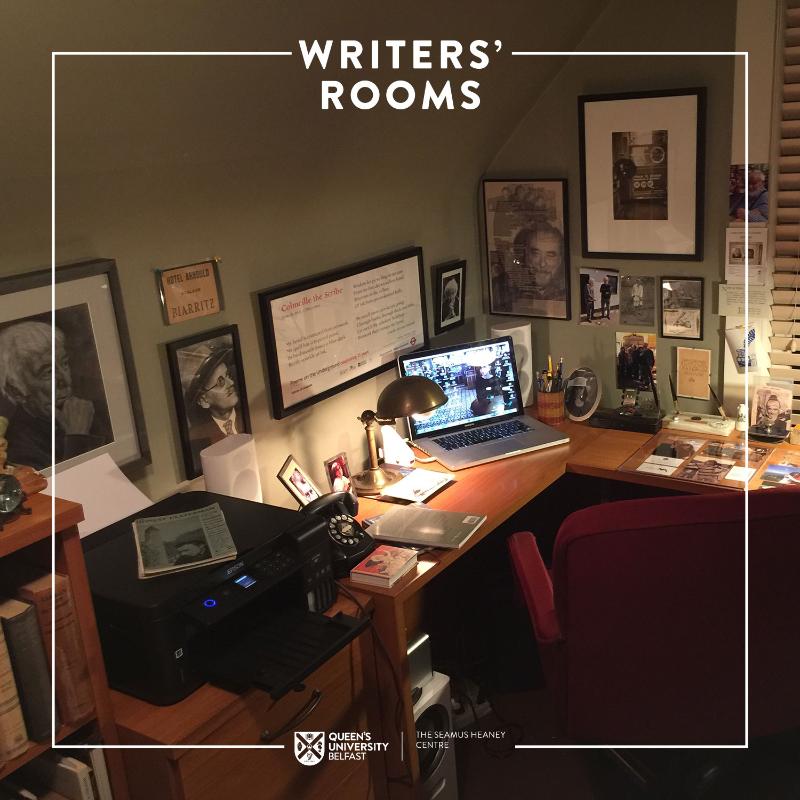
P.W. Bridgman (Tom Woods) is a Canadian writer of poetry, short fiction and book reviews. A participant at the Seamus Heaney Centre’s summer poetry school in 2018, Tom is a recently retired judge, former barrister and the current editor-in-chief of the Commonwealth Judicial Journal.
Where are you?
In my study – my writing space, that is. It accounts for half of the top floor of our old house in bohemian East Vancouver (Vancouver’s version of the West Village). The other half of the top floor is studio space for Lydia, the love of my life, who is now pursuing her lifelong dream of studying art and art history. We have bookcases scattered liberally throughout our house, but my study is where the poetry books live – shelves upon shelves of them – together with numerous reference volumes and a shocking number of dictionaries.
What are you working on?
I am making the final edits to two manuscripts – one a second book of poems, entitled Idiolect, and the other a second book of short fiction, entitled The Four-Faced Liar. I have promised both to my publisher by the end of the summer and I am cautiously optimistic that they will appear early in 2021, COVID-19 disruptions permitting.
What’s that over there?
That’s a brilliant pencil drawing of Seamus Heaney rendered by my talented sister, Barbara Bell. She gave it to me as a retirement gift in 2019. I couldn’t have been more thrilled. Seamus continues to be an enormous influence in my writing life and his mark is everywhere to be seen in our house. If you look closely at the picture of my study, you may also be able to pick out a small photo of me standing with Barney Devlin outside his blacksmith’s shop in Hillhead. (Yes, that’s the Barney Devlin immortalised in Seamus’s poems, “The Forge” and “Midnight Anvil”). Lydia and I had a grand visit with Barney in 2015; alas, we and the wider world lost him the following February.
What’s that sound?
It’s Bill Evans, or maybe E.S.T., or maybe the Marcin Wasilewski Trio (my current musical obsession) playing softly through my laptop’s satellite speakers. I do tend to keep things quiet in my study when I’m writing but piano-based jazz can often be heard in the background when I’m reading.
How does isolation help or hinder you?
The isolation made necessary by the pandemic has been both a blessing and a curse. (I pause to say parenthetically that, of course, my complaints are mere trifles compared to those suffered by people who have fallen ill, who have lost loved ones to COVID-19 or who have lately been cut off from visiting aging relatives in long-term care facilities. I have been spared all of these things, thank God.) It is true that the isolation has brought with it more time for writing. For that I am grateful. But it has also brought a distracting and pervasive sense of malaise and uncertainty together with a lamentable diminution in face-to-face contact with friends and family.
Overall, my creative output has improved a little, but not as much as I expected.
Time for a break…?
Lydia and I try to get out for a brisk walk, usually of about an hour’s duration, once each day. That typically takes us around nearby Trout Lake (an urban lake, ten minutes away, imagine!) and then up the very funky Commercial Drive to Prado where the cappuccino has attained the stature of an art form and is crafted better than anywhere else in the city. Lately the weather has been sunny and so that enhances the experience, but we enjoy this little ritual even when it’s raining.
What are you reading/watching these days?
I’m deep into Anna Burns’s Milkman at the moment....
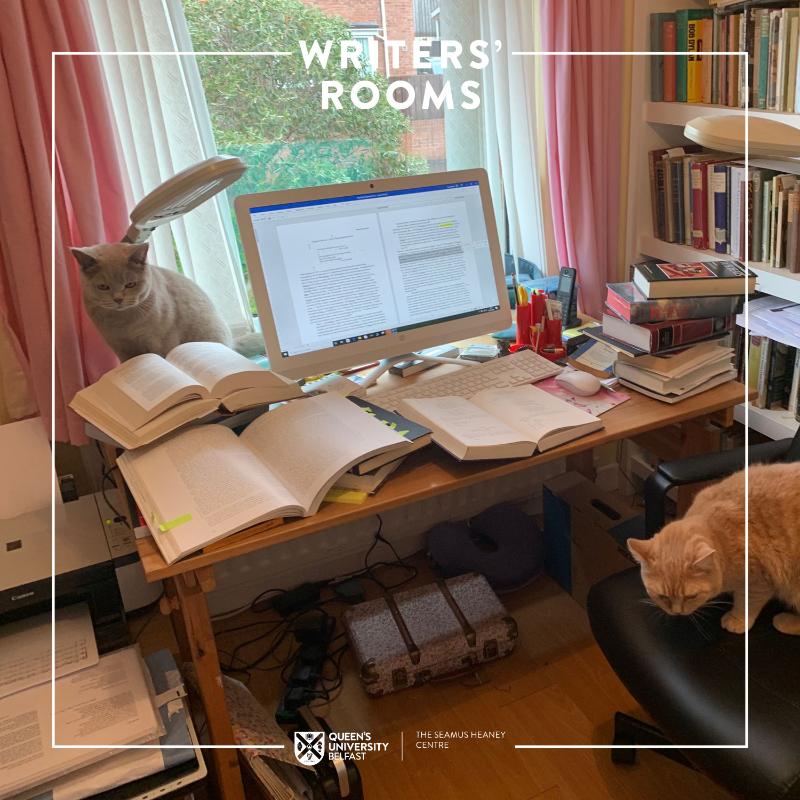
We join Fran Brearton in her book bunker to drink coffee and ask the big questions, with some demanding (but adorable) study buddies.
Where are you?
In my cramped and chaotic study. It used to be my daughter’s bedroom until she claimed a bigger one - hence the pink curtains. In another five years I might get around to changing them.
What are you working on?
An essay on poetry, flight and modernity. I’ve been trying to work out if Oliver St John Gogarty ever took Yeats up in a plane. Nothing like asking the big questions.
What’s that over there?
A cat. Two cats. Sooty and Sweep.
What’s that sound?
Purring.
How does isolation help or hinder you?
I haven’t had a moment to myself since the schools closed; my laundry is as out of control as my email; my cats have developed domestic staffing expectations I won’t be able to meet long-term. But I feel a reluctance to emerge from my book-bunker, so something about it works for me.
Time for a break…?
Yet more coffee, which I’m not really supposed to drink. So it’s a guilty pleasure, like facebook.
What are you watching these days?
Mrs America. Brilliant.
What might you revisit in times of crisis or uncertainty?
W.H. Auden, ‘In Memory of W.B. Yeats’. That said, the line that comes to mind most frequently these days is Stevie Smith’s ‘not waving but drowning’!
Best advice for writers?
I’ll borrow from Robert Graves, whose advice from his headmaster on leaving school (and heading to the trenches) was: ‘Well, good-bye, Graves, and remember this, that your best friend is the waste-paper basket’.
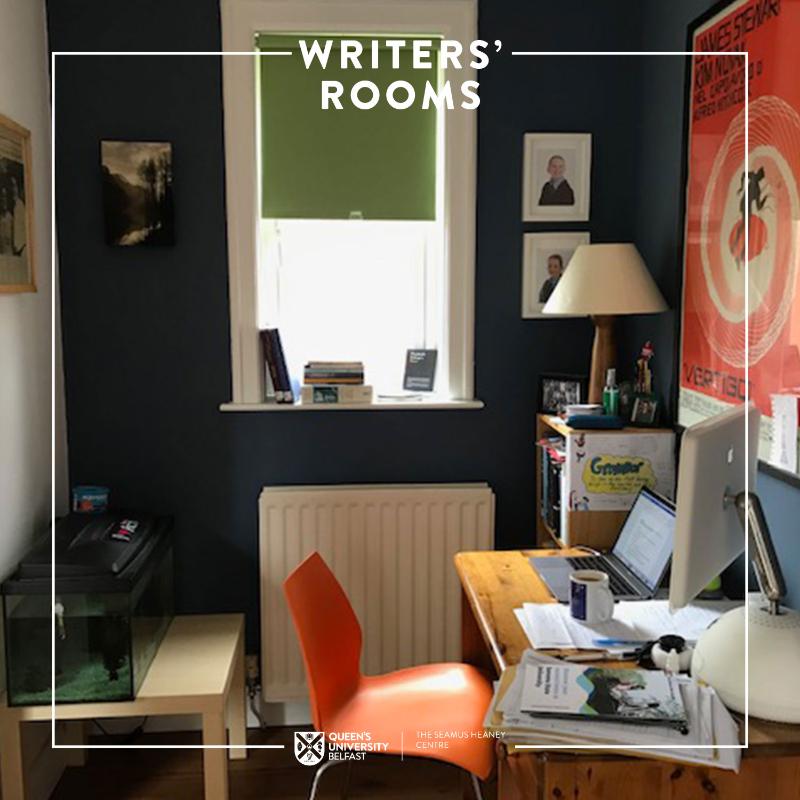
Philip McGowan invites us round to distract him from his Gatsby, Fitzgerald, and Bishop deadlines, and to discuss some of the finest American writing of all time.. Schitt's Creek.
Where are you?
Not so much a room as a nook – or is it a cranny? – between the kitchen and living-room which doubles as my “office” where life in lockdown and otherwise has mostly been spent. This is my Zoom, Teams, Skype and FaceTime salon, as it were, and just looking at the photo I realise I need to do a bit of a tidy.
What are you working on?
I’m not a writer writer, though I do write things: academic stuff for the most part. I’ve just sent off the draft of a new edition of The Great Gatsby for Penguin in the US and the next thing I will turn my hand to will be revisions on a chapter for a composite biography of Fitzgerald coming out next year. For that, twenty-two Fitzgerald scholars have all chosen a specific two-year period of Fitzgerald’s life to write about: I chose 1900-01, when Fitzgerald was four, five, then six years old. After that, and with a sabbatical coming up, I’ll be going back to some other ideas about Elizabeth Bishop’s poetry.
What’s that over there?
You mean the fishtank? Or that there? [points]: that’s Lila, a now four-year-old rescue dog who right now is snoring lightly in her bed after chasing up and down the beach at Helen’s Bay earlier on.
What’s that sound?
Apart from the snoring and the hum from the fishtank? Probably the kettle which has seen more use in the last 6 months than nearly any other device in this house. Otherwise, it’s pretty quiet here. And now the 12th has passed, the helicopters have been returned to their helisheds.
How does isolation help or hinder you?
If you’ve had the misfortune of reading any of my tortured critical prose you will quickly realise it takes a great deal of silence and time to be able to pull that stuff out of the ether. I’m easily distracted – please, distract me – so I can only make headway with anything when I have solid blocks of time to concentrate on it. So, in some ways, lockdown hasn’t changed that much of how I go about things. The Gatsby edition and revisions on an essay on Bishop – sorry, again, Jonathan and Angus for taking THAT long – these aside I have found it almost impossible to write anything during these months. Partly that has been due to a pretty regular stream of online meetings and partly the daily need just to survive to the end of the day during a global pandemic…
Time for a break…?
It’s July in Belfast, so obviously it’s raining – a turn in the garden is therefore out as an option. It would just mean throwing a tennis ball for Lila to fetch and drop expectantly by my feet for another throw-and-fetch round. I’ve PhD work from students looking at me from my inbox, so I should really turn my hand to that. Maybe after another tea though.
What are you [reading/watching/listening to] these days?
I’m keeping Richard Ford’s new story collection Sorry For Your Trouble for a few days’ holiday in Galway. Otherwise, I’ve been working back through Bishop’s letters in the One Art selection – she is so dry and on point in almost every single letter. It’s taken me years to pluck up the courage to write about her poetry: I doubt I would ever have said hello to her if I’d had the chance to meet her in real life. I’ve also just finished reading Bernard Sumner’s autobiography Chapter & Verse which I’ve been meaning to get to for years – fine, dry laconicism occupies every page. I can’t believe he turned 64 this year…
TV-wise, last night I got to the final episode of Schitt’s Creek. Slow to gather momentum but then it was just everything you’d want from a situation comedy: sharp, funny, empathetic, perfectly judged.
As for music, I put shuffle on at the start of writing these responses: currently The Organ is playing ‘Basement Band Song’ and that feels oddly appropriate. Otherwise, when walking Lila, I’ve developed a lockdown habit of listening to podcasts – anything from the Wicked Game series about every US Presidential election since Washington, old episodes of Desert Island Discs, analyses of Søren Kierkegaard’s writings, and podcasts dedicated to the glory that is Leeds United, risen again to our rightful place having just won the English Championship under the brilliant enigma that is Marcelo Bielsa. (I had to get Leeds in somewhere.)
What might you revisit in times of crisis or uncertainty?
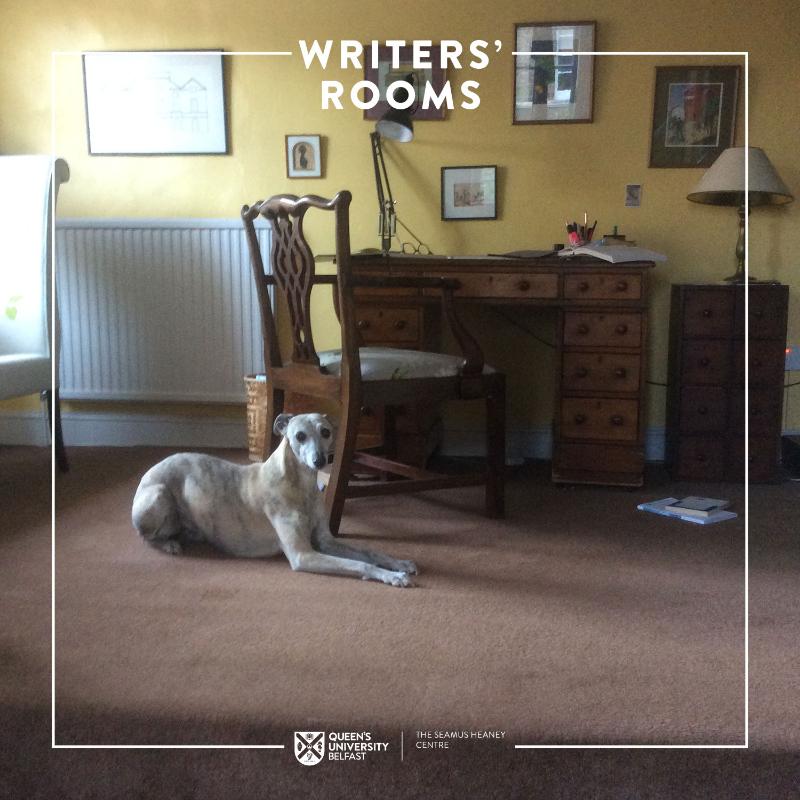
Laura Scott, winner of the Seamus Heaney First Collection Poetry Prize 2020, invites us to her commandeered 'writing room', to tell us about lockdown collaborations, and making poems go where they thought they couldn't.
Where are you?
In a kind of raised stage bit of my sitting room, it’s not a separate room because it doesn’t have a door, but you do have to go up two steps to get to it. Its like an afterthought, and I’ve been engaged in a subtle power play over the years to claim it as my own.
What are you working on?
Poems that are nothing like the poems in So Many Rooms. Right now, I’m working on a collaboration, it’s the second one I’ve done in this weird locked down world. They are such strange things,the way you lose sight of your own voice and the heady mixture of euphoria and constraint when two people are writing one poem. I’m also experimenting with pushing and coaxing my own poems into making another move, to carry on and take off from the place where they would have ended before. That makes it sound very ambitious, maybe that’s why I have so many breaks.
What’s that over there?
That’s my dog Mouse. She comes up here sometimes to remind me how nice it is walking her.
What’s that sound?
Someone somewhere in the house shouting to someone else in another part of the house. Everyone is getting louder and lazier by the day.
How does isolation help or hinder you?
I wish I knew, there are too many people in this house.
Time for a break…?
Always.
What are you [reading/watching/listening to] these days?
I’m quite an unfaithful reader, falling in love with voices that are new to me, zooming about between them trying to work out which is my favourite. Some of the people I’m reading right now are Jenny Wong, Rachel Long, Ada Limon and Natalie Diaz’s collaborations, Juana Adcock, Julian Stannard.
What might you revisit in times of crisis or uncertainty?
I go back to poets that got me started, poets that do things I want to do. So Eavan Boland, I love her grace. It’s an over-used expression but in a lot of ways she gave me permission to start writing poems. Jorie Graham, there’s one particular poem of hers, ‘The Dream of the Unified Field’ I go back to that a lot and dream of being able to move like that.

We join Susannah Dickey in her writing room, where the laundry seems admirably well-organised (in spite of conspiratorial pigeons), and a new novel is in the making..
Susannah Dickey's first novel Tennis Lessons (Penguin, 2020) will be released on 17 July. She is the author of two poetry pamphlets, both published by The Lifeboat Press, and is currently completing a PhD with us at the Seamus Heaney Centre.
Where are you?
My kitchen.
What are you working on?
I’m trying to do a novel. A split narrative jobby – formally a bit redolent of How to Be Both, by Ali Smith, or Asymmetry, by Lisa Halliday, but obviously less good than either of those.
What’s that over there?
What’s what over where? What are you talking about? What – wait, what is that? How did – how did you get in here? Get out of here! Get away from my face!
What’s that sound?
The pigeons on the fire escape. I think they’re planning a coo.
How does isolation help or hinder you?
I’ve never been quite so diligent with laundry. Also, I suspect my popularity ratings have gone through the roof since I’ve stopped being able to see people.
Time for a break…?
Hummus. Fresh and viscid primordial giver of strength.
What are you [reading/watching/listening to] these days?
I’m spending a lot of time on the Wikipedia page for Dinosaurs, an American sitcom that ran from 1991-1994. I’m also reading Record of a Night Too Brief by Hiromi Kawakami and listening to St. Elmo’s Fire (Man in Motion) by John Parr.
What might you revisit in times of crisis or uncertainty?
My Private Property by Mary Ruefle, and The Purge.
Best advice for writers?
If you’re struggling with how to end your short story or novel, I suggest, ‘And reader, the protagonist of this story…
….was me’. Never not a winner.

Poet and lecturer in Poetry Gail McConnell invites us to her writing room (in lieu of the woods), for a flat white, and an insight into the writing/raising a toddler life.
Where are you?
At my desk in a room in a house on a street in the east of the city of Belfast.
What are you working on?
I’m listening to a file Conor Garrett has just sent me – it’s the draft of Fothermather, a programme our family has made with Conor for Radio 4. It features some of my poems and quite a bit of poddling around in rockpools. Making this has been a very special experience. It airs on 2nd August – tune in!
What’s that over there?
A collapsed toilet roll tower, built by our two-year-old with help from his mommy. Also some narwhals and a great board book called Magritte’s Imagination. This was the scene I came back to after lunch.
What’s that sound?
Inspiration. No, wait – it’s the builders kangoing the plaster off the outside of the house next door. Oh, and that’s Finn squealing.
How does isolation help or hinder you?
With a toddler at home, no one is isolated. That hinders my capacity to think or write or read for any extended period. And it helps me play, work on my nonsense talk and practice juggling lemons.
Time for a break…?
Time to work on my milk texturing. I’ve been trying to perfect a flat white since the start of lockdown. The fixed angle of the wand is a hindrance. I struggle on.
What are you [reading/watching/listening to] these days?
Before 8pm: Meg and Mog / Sesame Street / the Pete’s Dragon soundtrack.
After 8pm: Lucretius / Queer Eye / Phoebe Bridgers
What might you revisit in times of crisis or uncertainty?
The woods.
Best advice for writers?
Nothing happens without the bit where nothing seems to be happening.

Seamus Heaney Centre Coordinator, Rachel Brown is in the eaves, trying to establish the connection between antimatter and migratory butterflies.
Where are you?
The top room on the second floor, in the eaves, with a view over leafy Fortwilliam to Cave hill. Ciaran Carson country. When we fixed it up, my ‘vision’ was Matisse’s The Pink Studio (if Matisse had a yoga mat running down the middle of his room). It’s lately become L’Pink Room, an exclusive cocktail bar for quarantined weekends. You’ve got to go up and down two flights of stairs every time you run out of ice, but the negronis are lethal.
What are you working on?
I should probably say, I’m not a writer. I’m an artist who often uses writing. I have a collaborative practice with Brighdin (readers may know her as a regular bell-ringer at our SHC Presents nights), and we’ve been making things together as Brown&Bri for over a decade.
We’re in research mode at the moment thanks to some Freelands Foundation support, reading about antimatter and migratory butterflies. They’re definitely connected, we just haven’t worked out how yet. Things predicted before they can be observed, 'marble statues falling out of the sky', and the imaginative potential of cities are also in the mix.
What’s that over there?
Timber baton that will become a stretcher for a screenprint by Colin Darke. ‘La beaute est dans la rue’ it says. A print by Evan Cohen which seems to represent the second law of thermodynamics (my favourite law of thermodynamics), and a watercolour memorialising my first encounter with the Pacific Ocean.
The seemingly blank page on the chimney is a print by Aimee Nelson. It gives an account of Plato’s thought experiment, the Allegory of the Cave, where prisoners in a cave understand the world through shadows, their perceptions of reality shaped entirely by their limited visual experience. The text is only visible under UV light and comes with its own little torch.
What’s that sound?
My ‘WORKING’ playlist on the Seamus Heaney Centre Spotify. It’s easier to work without lyrics that I can understand. So there’s Gruff Rhys, Caribou, Hailu Mergia, and a bit of Charles Mingus yelling ‘oh yeah!’ to keep spirits up. And some birds stomping on the roof. Very heavy-footed for creatures weighing the same as a bag of crisps.
How does isolation help or hinder you?
I like company when I’m working on Heaney Centre stuff downstairs. Helpfully, my new home office buddy is the programmer at the QFT, so our lockdown films on QFT Player have been a fun shared project. When I’m trying to be an artist it’s good to be up high here by myself, removed from temptations to tear apart the kitchen, or any those projects you suddenly find a creative spark for, when you’re meant to be creatively sparking elsewhere.
Time for a break…?
Breaks are good and I’m all for self-care.. but it’s also good to remember, you’ll sleep when you’re dead. Get on with it.
What are you [reading/watching/listening to] these days?
I’m re-reading a few things that might feed into art somehow, including Sill Life with Oysters and Lemons by Mark Doty, The Consolation of Physics by Carlo Rovelli, and Thomas Pynchon’s The Crying of Lot 49. This last one stung a bit with the backdrop of America’s sheer, mad, nightmarish cry for help. I also just finished The Overstory by Richard Powers, which I want to talk to someone about but I don’t know who else has read it.
We’ve been watching some excellent films on MUBI, balanced with Star Trek the original series. Those outfits, that set design… I won’t apologise. And the Belfast Ensemble staged a production of their Ten Plagues during lockdown. It charts the great plague in London of 1665, draws parallels with the AIDS crisis, and has a whole new resonance in quarantined Belfast. It's available to rent on QFT Player.
What might you revisit in times of crisis or uncertainty?
Always Italo Calvino and Jorge Luis Borges. Anything by those guys but perhaps at the moment, particularly The Distance of the Moon by the former, and The Witness by the latter. And I read Jose Saramago’s Death at Intervals the other day and remembered what a good thing it is. His dialogue between an ‘apprentice philosopher’ and the surface of the water of an aquarium is completely delightful.
In an ironic moment recently, I picked up the programme from Thomas Adés' The Exterminating Angel that I saw back in 2017. I couldn't quite remember it. Turns out it's the one where a house party gets inexplicably trapped in their host's drawing room for days, they all go a bit feral and it's a giant surreal metaphor for inequality in a rotten society. Hmm.. Available on demand from the Met Opera if you're interested.
Best advice for writers?
Read Kurt Vonnegut, Listen to David Byrne, Be a good human being.
Life’s a beach, and life is good.
Bisous.
Less advice, and more slogans on three t-shirts I’ve worn recently.
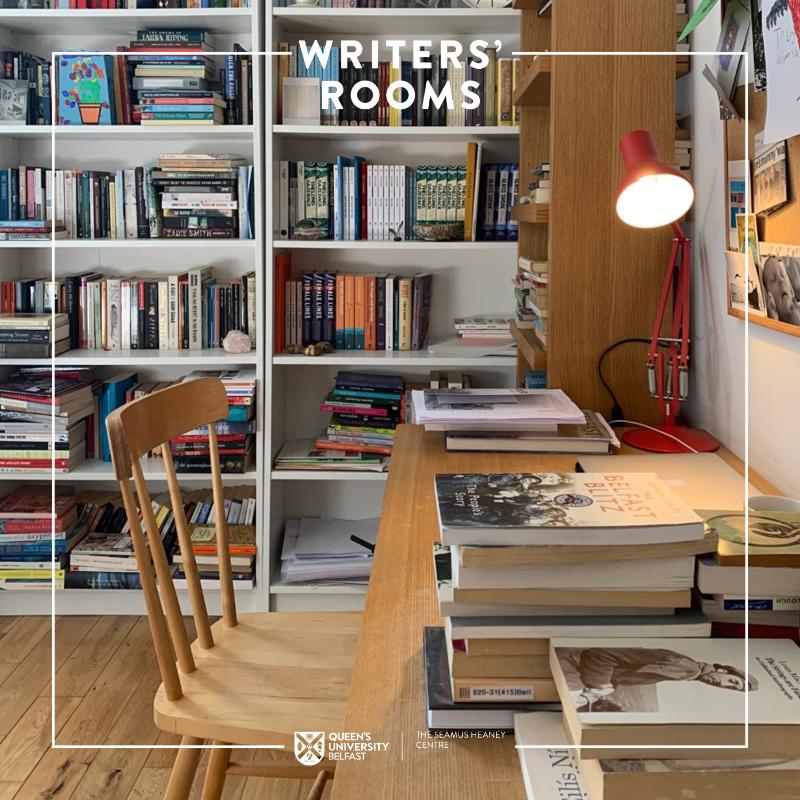
We're in the writing room of novelist, playwright, and former SHC Fellow Lucy Caldwell, in the company of owls and dinosaurs, dreaming of the dive bars and gigs we'll go to soon. Lucy's new collection has been delayed due to.. well, you know. But here she tells us what she's working on, and some of the things that are filling the well, emotionally and creatively.
Where are we?
The nerve centre of operations: the three bookshelves and desk that I refer to as my study, in the corner of my bedroom, which was also until recently (recently? who am I kidding, she still comes in every night) my 2 year old’s bedroom. Oh and! when lockdown commenced, my husband built a second desk at right-angles to mine, though luckily (sic) one of us always has to be on in the kitchen-living room on childcare at any given time.
What are you working on?
A world that I hope – wonder – fear – is going to be the place in which I spend the next few years. Belfast, April-May 1941, just before, during, and after the Belfast Blitz. I’d been slowly accruing wisps, scraps of it for months, and then suddenly lockdown was upon us, and my retreat there for my carved-off hours every morning has become something of a sanctuary, a lifeline through all of this.
What's that over there?
A silver owl with yellow eyes, drawn by Corinna MacNeice – yes, daughter of, but a fine artist in her own right. Above it is a rather ferocious-looking owl drawn by my 5 year old son, and below that, on my desk, a 1960s Italian alabaster owl paperweight that I found a couple of years ago at a flea market. I didn’t realise, until I wrote this, that I had such a thing for owls, though I suddenly remember that I used to collect them as a child. Maybe now they’re collecting me.
What’s that sound?
Undoubtedly a parasaurolophus, or what I am assured is a realistic impression thereof, though, who knows? it could be brought to us by intravenous Howdytoons. Don’t worry. If you can still hear me over it, we have a while yet, at least a couple of sentences’ worth. I don’t quite keep a blackthorn stick at my desk, like the fabled one of Edna O’Brien’s, to beat away intruders – maybe we all should.
How does isolation help or hinder you?
Iso- sorry, that would be, what?
Time for a break…?
I don’t dare leave, for fear of the parasaurolophuses stalking the corridors. If I could, I would make another coffee – in the second stovetop Bialetti pot we own, because I allegedly ruined the first by repeatedly putting cardamom in to infuse with the coffee grounds. (That was the last time I wrote a novel, almost a decade ago). Actually, if I could, I would go to the coffee shop in Old Compton Street in Soho where I used to buy my supplies and have a proper cardamom coffee there. Or maybe I’d skip the coffee and go straight to the dim crush of some underground dive bar. That would be nice.

Writer, dramaturg, and member of our Advisory Group, Emily DeDakis was the first person to gain a PhD in creative writing from the Seamus Heaney Centre, which also makes her the first person to gain a practie-based creative writing PhD in Ireland.
Where are we?
Dropping anchor goes against everything in me, y’all. So my coffee mug is from Washington, DC, my t-shirt is from St Davids, Wales, and my mind is wandering to Barcelona, Edinburgh, Denver & New Orleans. I’m thinking of friends in Stockholm, Dallas, Antwerp & Mexico City. I’m having dinner on Zoom with my family in Baltimore & Los Angeles...
Really though, I’m at home in North Belfast with my guy, Tom. We live in an old mill building between two peace walls. The windows are tall and I can see the whole city. It’s on the cusp of a handful of neighbourhoods; most days I hike around Ligoniel, Woodvale, Ballysillan, Ardoyne, Oldpark, the Waterworks, Cavehill, Little Americas. At the quietest place with the biggest trees, I stop for a smoke & think about sequoias.
Even inside, I’m on the move. I don’t have a set writing space, because I almost never write at home. Right now I’m in the window seat. Half an hour ago I was at the kitchen table. Late at night I work on the couch wrapped in a blanket, watching the streetlight shadows on the wall.
How does isolation help or hinder you?
THIS seems to have either liberated or hogtied people. The biggest enemies of my productivity are 1) working from home/anywhere solitary and 2) working in isolation/without collaboration. I dig the back-and-forth of working with sound artists & theatre-makers, or writing for radio & TV. Even for the solo writing bits, I like being out & about. I’m one of those strange souls notebooking or laptopping in cafés: All we want is a little not-peace & not-quiet. In college I wrote in noisy New Orleans bars; in high school I did my homework outside the band room during drumline practice. I could have told you twenty years ago that writing in quarantine would be UGH for me.
What are you working on?
WELL, since you asked, writing has been UGH for me ... but wee sprouts are starting. I’m nudging newborn ideas with an animator and a sound artist. For a residency (now from afar) with Household Belfast, I’m writing a version of Noah’s Ark set in Sailortown. There are a couple of TV ideas on the go. One is called The City That Can’t Stay Awake (title nicked from Glenn Patterson’s The International), about a café in Belfast open 5 p.m. till 9 a.m. (If anyone’s up for investing in that café, I’d rather run it than write about it.)
Also I work with Fighting Words and Accidental Theatre – two tiny, mighty arts organisations working on navigating the new NOW.
Read Emily's full Writers' Rooms interview here...

Recent graduate Caitlin Newby is in Los Angeles, staying occupied with tutoring and tequila towers. Caitlin completed her PhD with us, and was awarded the inaugural Bookfinders Chair in 2019.
Where are we?
I have set up camp in the dining room of my dad’s house in Los Angeles. There are three of us working from home and luckily I’ve snagged the biggest table.
What are you working on?
Not much ‘creative’ writing at the minute. I’ve been writing letters to friends and a column for the newsletter of a family friend’s charity, but I’ve also been super busy tutoring (remotely, of course).
What’s that over there?
That red thing under the hutch is my stepmom’s ‘tequila tower’. Google it.
What’s that sound?
The children next door playing in the pool. There seems to be very little virtual learning going on over the hedge…
How does isolation help or hinder you?
This is actually my ideal—alone, busy, with someone to talk to in the next room, if I need a chat (though if I had a choice between my friends and my folks…)
Time for a break...?
I’ll take a walk around the neighbourhood, or just sit in the backyard with a book and a popsicle (that is, an ice lolly).
What are you [reading/watching/listening to] these days?
Keeping Up with the Kardashians is the only American trash TV programme I always want to watch. Music: Fiona Apple and Talking Heads. As for books, I’m alternating between Braiding Sweetgrass (Robin Wall Kimmerer) and Return of the Native.
What might you revisit in times of crisis or uncertainty?
I recently/finally read Barbara Tuchman’s A Distant Mirror: The Calamitous 14th Century. It reminded me a lot of Game of Thrones, and also that history is cyclical. And: Virginia Woolf’s essays.
Best advice for writers?
Don’t listen to me.

Poet, critic, educator, and invaluable member of the Seamus Heaney Centre's Advisory Group, Gerry Dawe invites us into his writing room, and shares a poem from his latest collection The Last Peacock, published in 2019.
Looking Through You: Northern Chronicles, a memoir, will be published 10 August. Gerald Dawe is Professor of English and Fellow Emeritus, Trinity College Dublin and founder director of Trinity Oscar Wilde Centre (1998-2015).
Where are we?
In Dun Laoghaire, County Dublin. In a turn of the last century terrace house, with a wee back garden with a workstation currently our daughter’s office as we are cocooning. (Although I’ve been cocooning for many a year when the chance beckoned!). The house is part of the old ‘Kingstown’ housing stock. When we arrived here first there were still artisan cottages in which carpenters, electricians lived –who had serviced the extensive grand homes in the crescents and terraces up above us. The social history of the area is fascinating but now it’s mostly buried in the redbrick renovations. Cyril Cusack lived on the terrace next to ours and Wilfred Bramble (of Steptoe & Sons fame). The family of Beckett’s pal, poet Brian Coffey lived a little up the road. There was an Edwardian grocery across the street from us which was straight out of Joyce’s Dubliners. It’s apartments and a solicitor’s office now. It all reminds me of the north Belfast I grew up in in the fifties. Dublin Bay is a short walk away and the Martello Tower which opens Ulysses. There’s also the wonder of the harbour and lots of other literary references. But our family home is just that.
What are you working on?
I’m clearing the decks! I had several ‘projects’ languishing on the back of the back burner and now I’ve been sorting them out at long last. Prose books in the main, the legacy of publishing material that scattered to the four winds and disappeared. I’m trying to bring it all together into some kind of coherence. I’m also writing a few new poems but it takes me ages to find my way into that ‘space’ – cocooning or no cocooning - especially after having published a new collection (The Last Peacock) late last year. Thom Gunn remarked that he tried to hold back some poems when he published a new collection so that there wasn’t this kind of hiatus and you had something in the bank to work on. Not a bad idea.
What’s that over there?
That’s the Clock Tower of the Town Hall preceded by the steeple of St Michael’s Church. If you follow the flow you can imagine yourself in County Down before you know. The east coast of Ireland is really just a hop-step-and-jump between Dublin and Belfast, with the wonderful fishing villages and market towns vying with the bigger industrial city areas between the mountains and the sea. Hard to believe that it has all caused so much strife in our lives.
What’s that sound?
The sound of my dog Dash (real name: Kyoshi Dasheen) likely barking at a leaf falling. He (a ten-year-old Shiba) is very proprietorial and keeps us all in check when he is not in chilling-out mode himself.

With a house full of musicians, chefs, nerf-blasters, and rocket engineers, our former Children's Writing Fellow Myra Zepf invites us into the sanctuary of her writing room, where genies await (in some form or other).
Where are we?
In my home office. My beloved desk has spent years skulking in the corners of living rooms. Since we moved house recently, it now has a room of its own with a door that closes. The ‘Keep Out’ sign on the door is a vicious rumour.
What are you working on?
I’m working on dogs, genies, magical stonemasons, lighthouses, creepy crawlies and teenage idealism. But not all at once. I’m turning them into a short story, a picture book, and animated film and a verse novel. I hope.
What’s that over there?
I’m glad you asked about that. It’s an Arabian Nights magic lamp I found in Oxfam. I kind of wished for it – not even out loud – and it appeared in the bric-a-brac section and now I’m scared to rub it…
What’s that sound?
Em, it might be an 11 year old playing the fiddle. Or a 12 year old shooting a nerf strike blaster. Or a 14 year old exploding CO2 canister rockets in the back yard. Or a 15 year old cooking something that requires every saucepan in the house. Or a 16 year old learning White Stripes chords on the guitar. There are 5 kids here. I can’t hear a thing la-la-la-
How does isolation help or hinder you?
I would love to try it sometime to find out.
Time for a break…?
A stroll up the Holywood Hills with the ipod. Panoramic views over Belfast Lough, gorse and the Women’s Hour podcast. Pure bliss.
What are you reading/watching/listening to these days?
I’m loving Naomi Novik’s folktale-inspired novels. I’m also slightly obsessed with wordless picture books by Shaun Tan and David Wiesner among others. And I have a weekly date with the Duncairn’s Virtual Cabaret - the perfect mix of artists I already love and new discoveries.
What might you revisit in times of crisis or uncertainty?
Just before lockdown started, we put on a dance show of my book ‘An Féileacán agus an Rí’ – (The Butterfly and the King) choreographed by Clara Kerr. I made a playlist of all the music she had chosen for the show. I keep listening to it at low moments for the beauty of the pieces, for the memories of happy busy days and for the promise that one day we will be back out there in the world putting events on stage, no matter how long that takes.

We're joining Ian Sansom in his writing room, to distract him a while, and dream of returning to the library one day.
Where are we?
We are at a point in time in which nothing is certain.
What are you working on?
My patience.
What’s that over there?
Over there? Where? Oh, there. That’s the back of the Leeders Accident Repair Centre. They also sell honey.
What’s that sound?
The voices in my head.
How does isolation help or hinder you?
‘It is only in degree that any improvement of society could prevent wastage of human powers; the waste even in a fortunate life, the isolation even of a life rich in intimacy, cannot but be felt deeply, and is the central feeling of tragedy’ (William Empson, Some Versions of Pastoral).
Time for a break…?
Time for a Kit-Kat.
What are you reading/watching/listening to these days?
Emails/Israeli tv/my parents’ stories about life in the Old Country.
What might you revisit in times of crisis or uncertainty?
The library.
Best advice for writers?
Write.
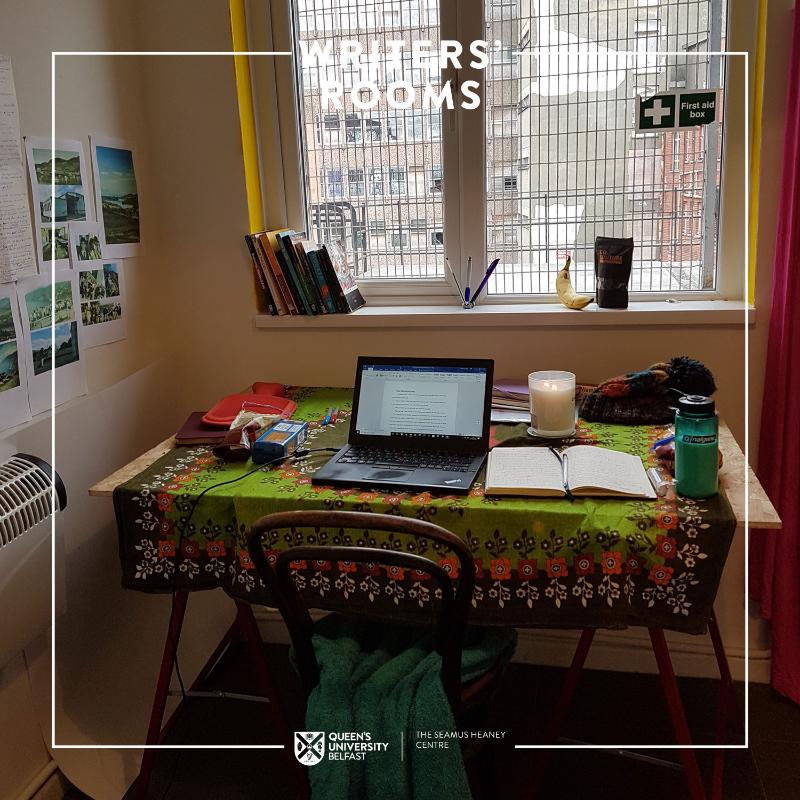
Write Night instigator, and former student Niamh Scullion invites us into her writing room, a space secured through a recent iDA award from the Arts Council for NI.
The iDA funding programme is a dedicated annual arts development programme, delivered through the University of Atypical, to enable deaf and disabled artists who are working in a range of art forms to develop their professional artistic careers.
Where are we?
In my writing room on the top floor of PS Squared, which is deserted at the minute. I have only just gotten the space, thanks to an iDA grant, and it has made all the difference to my writing practice. I'm here to write and there are no distractions at all.
What are you working on?
I'm working on a short film script called Takeaway which is about intercultural connection/disconnection and friendship, and also a YA novel which is hard to talk about as i've only written 55,000 words of it and they'll probably all change. But I suppose the things that are fixed are: themes of adolescent shame and bereavement, facing fears of moving on, generally growing up. It's also about spending a summer refusing to learn a dead (controversial) language.
What’s that over there?
Outside my window are Cathedral Quarter buildings that are marked for demolition, every building in my range of vision, including the one I'm in. So there's a bit of a fugitive feel to the place at the minute.
What’s that sound?
Mysterious creaking and clanking from some floors below, or next door.
How does isolation help or hinder you?
It helps me. I usually have a very busy life with charity and community work, and my paid job, so the isolation has come at a great time for me to really focus on this story, because jaysus it takes a lot of mental energy.
Time for a break…?
I sit outside in the balcony/roof drinking coffee and watch pigeons chasing each other in and out of broken windows opposite. Or when I'm home i'll go running or cycling with my teenage kids.
What are you reading/watching/listening to these days?
I've been re-reading Save the Cat and also Watership Down, watching DEVS, and on a related note, listening to Congregation by Low. I wish I could do podcasts but alas, my hearing is too bad.
What might you revisit in times of crisis or uncertainty?
Probably Belle and Sebastian's If You're Feeling Sinister album for that 90's nostalgia. I have been enjoying Ciaran Carson's Still Life in this uncertain time, because that world is so small, observant and thoughtful, and also familiar. So that feels right at the minute.
Best advice for writers?
I'm more in the receiving advice camp, as I haven't actually published any fiction at all. But I heard a piece of advice a couple of days ago which is probably worth repeating: 'If you want to be a writer, don't take on an absorbing career or do anything interesting that will distract you from writing'. I think that's good advice.
I also wish more writers would share their early drafts, mistakes and disasters and the inner struggles of the process. It would help create a waymap for people starting out.
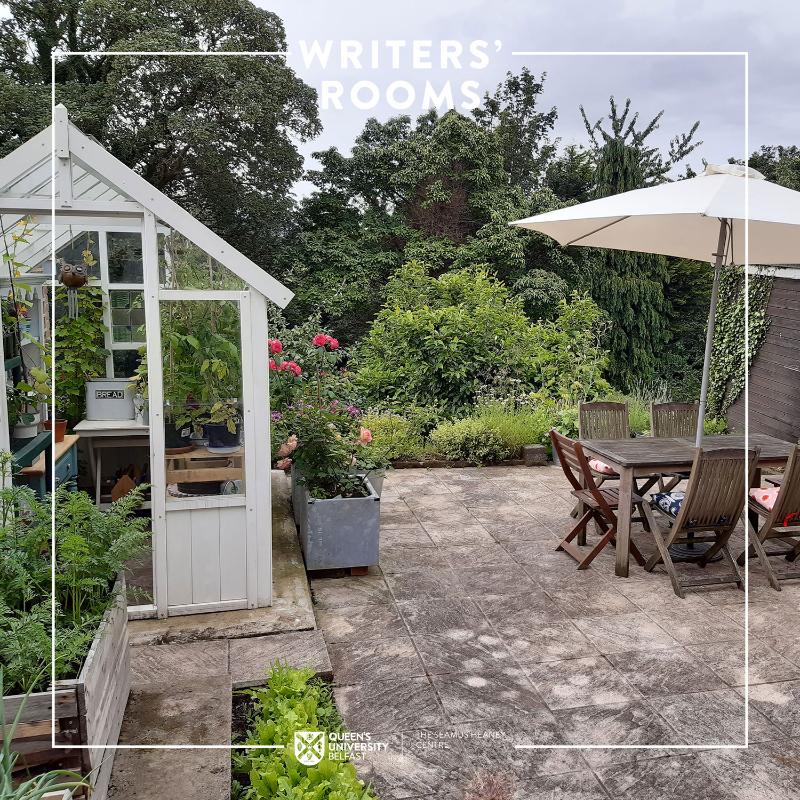
Our Children's Writing Fellow Kelly McCaughrain invites us into her writing room (not technically a room) for birdsong and tea, and shares the joys of being an introvert during lockdown.
Where are we?
My back garden. I can’t even claim that this is anything to do with lockdown because this is where I’d be anyway. I have some sort of neurological inability to concentrate indoors. In winter my writing often involves hot water bottles (I have a special granny-type one for my feet), blankets and many layers of clothing. In summer I get burnt to a crisp. I have a perfectly nice spare room but I just can’t write in there. It makes me feel claustrophobic and uncomfortably aware of myself. Ironically, when I’m outside, the world disappears. I’m very grateful to have a garden, especially during a lockdown. It’s on a slope so the patio at the top has a view of trees and hills and it’s sunny. I don’t mind isolation but being stuck indoors would probably kill me.
What are you working on?
I’m writing a novel for teenagers. There’s a lot about social media in it, which is weird when we’re all conducting our lives via social media now. I quite like social media but I hate Skype/Zoom calls which I now have to do every week. If this goes on much longer I will revert to letter-writing.
What’s that over there?
That line of trees at the bottom of the garden is the Comber Greenway, which is busier than ever these days. If I sit at the end of the garden I can listen to people walk by chatting about social distancing (it is ALL anyone talks about).
What’s that sound?
I think birdsong is one of life’s reset buttons and the garden is filled with it at the moment. We have a wildlife pond and the birds like to splash about in it but apart from them and the odd lawn mower it’s very quiet. The lack of traffic makes a huge difference. I’m going to miss that when this is over.
How does isolation help or hinder you?
Isolation is the one thing about all this that doesn’t bother me in the slightest. To be fair, I’m very lucky because I can work from home and have no children to home-school, but I like not having to go anywhere or meet anyone. And it definitely helps me write because I’m much more relaxed and less distracted when I don’t have to deal with other people. I’m setting myself deadlines and trying to get as much creative work done as possible because I know it won’t last. It’s like, for a short time (maybe the first and last time), the world has been redesigned to suit introverts and I feel bad about enjoying it when other people are finding it so tough. I feel like one of those women who felt guilty because they enjoyed World War II so much.
Time for a break…?
The thing about sitting in the garden is you spot things that need doing so when I take a break it’s usually to dig up dandelions or pot up seedlings or water the veg. Or I watch the tadpoles getting fat in the pond. And I drink tea. Lots and lots of tea.
What are you reading/watching/listening to these days?
I’m reading War and Peace! This is not an attempt to look pretentious, I just promised someone three years ago that I’d read War and Peace and I still hadn’t got round to it so I thought, if I can’t do it now, it’s never going to happen. I imagined it would be hard going but it’s surprisingly page-turner-y. It’s like Jane Austen except Napoleon keeps showing up and disrupting the balls.
Even if I wasn’t a gardener I’d watch Gardener’s World every week. It’s a very soothing show. Nothing bad ever happens on Gardener’s World. And I’ve been listening to The Times Literary Supplement podcast while sewing for the ‘NI Scrubs’ group, who are volunteers making scrubs for healthcare workers (if you can sew, check them out). We’re also binge-watching Catastrophe, which is the best sit-com I’ve seen in ages. Sharon Horgan (who co-wrote and stars in it) is hilarious.
What might you revisit in times of crisis or uncertainty?
Wendell Berry is always a font of sanity. And I can get lost in anything by Virginia Woolf. I read a lot of kids books too (obviously) and I find them very reassuring. I’d like to say something wise about them transporting me back to a childhood place of safety or something, but I think it’s probably just because they’re fun.
Best advice for writers?
I’m not sure I’m qualified to give anyone advice but the advice my very wise husband gives me daily is: Work when you can, forgive yourself when you can’t.

We join writer Louise Kennedy in her writers room/shed where we cover reasons for going to Queen's, seeing dead people, and which book made her scream at the end.. Louise is working towards a PhD with us at the Seamus Heaney Centre, and Bloomsbury will publish her debut collection The End of the World is a Cul de Sac in January 2021. Her story Sparing the Heather is longlisted for the Sunday Times Audible Short Story Award 2020.
Where are we?
I’m in a shed in my garden. The previous owner was one of those people who click your back in when you put it out. She used it as a clinic. We used to keep tins of paint and surf boards in it and then we fixed it up so I could work out here. I love it. Except in Autumn when the mice get in.
What are you working on?
A novel. An essay about my uncle. A short story for an adult literacy project.
What’s that over there?
The basket on top of the shelves belonged to my aunt when she was a student. It made me want to read, smoke and go to Queen's. I took to the first two at an early age but didn’t make it to Queen's until I was 48.
What’s that sound?
It’s the guy who lives two streets away singing ‘Love is in the Air’ in his back garden with a full PA. I wish I was joking.
How does isolation help or hinder you?
It is rare for this house to be empty but easy enough to get out to the shed. Last winter I went to a cottage on an island, all on my lonesome, to write. After a week I was seeing dead people, so I guess that means isolation hinders me.
Time for a break…?
I drink a lot of tea. While the kettle is boiling I put clothes in and out of the washing machine and squirt bleach around the place.
What are you reading/watching/listening to these days?
I appear to have read seventeen novels since this carry-on started. My favourite was Kamila Shamsie’s Home Fire; I screamed at the end. I also screamed at the end of series three of Ozark. I don’t always have a choice in what I listen to. My daughter dances to Lizzo and my son has taken up the piano again and plays Chopin nocturnes. On Friday nights I put on Lucinda Williams and eat cheese.
What might you revisit in times of crisis or uncertainty?
Singing along to ‘Nancy and Lee’ with a glass of wine in my hand always makes me feel better.
Best advice for writers?
I don’t know what I’m doing and therefore would not give advice. I like this from Dorothy Parker, though: ‘If you have any young friends who aspire to become writers, the second greatest favour you can do them is to present them with copies of The Elements of Style. The first greatest, of course, is to shoot them now, while they’re happy.’

We're joining Garrett Carr in his writing room to borrow some tracing paper, and guess what he might be working on and where trawlers come into it...
Where are we?
My room at the back of the house, overlooking the garden. I try calling it my ‘study’ but the term hasn’t quite caught on.
What are you working on?
A review, and something else too new to discuss. But that’s a picture of a trawler on my monitor, it’s definitely got something to do with trawlers.
What’s that over there?
A bird identification book on the windowsill. A map of Central America leaning against the wall. Six big rolls of tracing paper that I bought years ago and will do something with some day.
What’s that sound?
It’s probably my sons downstairs playing Escape from Atlantis, the original board game that I played at their age. I remember saving for months then hitching a lift to Donegal Town to buy it. When I’m nearby the boys call the game Escape from Donegal and laugh. I don’t entirely understand the joke. I think they imagine Donegal as a rocky, desperate place, menaced by monsters and falling into the sea. It wasn’t my intention, but I think they’ve gotten this impression from me.
What are you reading/watching/listening to these days?
I’m watching Trawlermen, a BBC documentary from 2006; listening to Tommy Potts’ album The Liffey Banks and reading The Dark by John McGahern. Now that I see them all in one sentence I realise the combination is a cold stew of quiet men and oppressive weather.
What might you revisit in times of crisis or uncertainty?
When weren’t the times uncertain? Of course there is a particular sort of uncertainty now, present and real for everyone, but I’ve always had an unhealthy awareness of instability. That could be why I’ve always set up rooms like these for myself, and retreated to them. Here at least I know where things are. Art often confirms anxieties, definitely the wrong place to go if you want to be soothed. It’s a temporary fix, but I might revisit some online shops and throw a few things in my basket. I need to be careful though, that’s how I ended up with six big rolls of tracing paper.
Best advice for writers?
Some free advice direct from my mother, ‘Turn off the Twitter.’
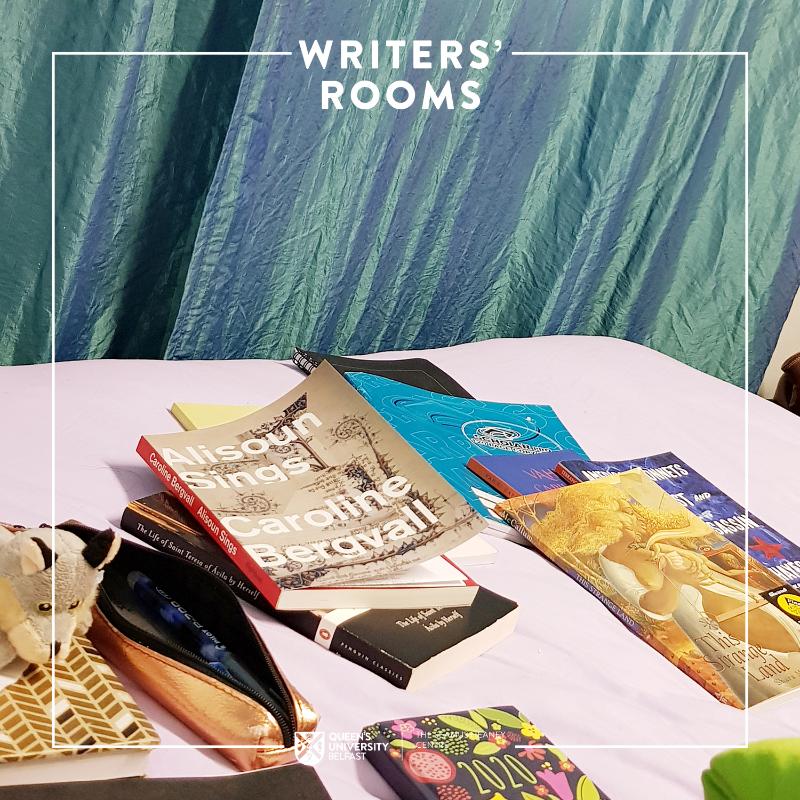
One of our SHC Fellows for 2020, Vahni Capildeo talks to us from across the Atlantic, where geckos, kiskadees, and other wild things conspire to distract from a lengthy reading list.
Where are you?
Across the Atlantic from the Seamus Heaney Centre: latitude 10.536421, longitude -61.311952, in my mother Leila’s house in Port of Spain, the capital of Trinidad and Tobago. My bedroom is the study which opens off Leila’s room, with sea-blue carpet that is two years older than I am. The window faces east onto the back garden. Kiskadees and wild parrots punctuate pre-dawn to early night. There is some creature that gallops across the metal roof and presumably launches into the mango tree. I leave it to its own devices. Disconcertingly, the North-East Trade Winds bring the roars of the lions in the zoo on a nearby hill very close. Sometimes bells are audible. I love the persistence and fading of that sound, which seems to make widening spirals, as if air were water. There’s no desk in here, in fact no chair, so I’m working from my bed. I’ve been solitary by choice for a long time, and my bed happily doubles as a reading niche. Almost as good for naps as the desks of beloved libraries.
What are you working on?
I am trying to find a livable medium between the scattering and distraction which comes from living online, and the heavy placedness which comes from being locked down. Trinidad and Tobago’s Prime Minister is a qualified volcanologist from a unit that provides training and advice on disaster preparedness, and his lockdown régime, rightly, is no joke. As for writing: there is a vague glimmering of a poetry sequence of seven days, ‘Days of Approximation’, that might and might not be a week, but I’m holding off putting anything on paper. Some people are losing a sense of time. ‘Approximation’, as a word, holds the potential for approach and proximity, and is forgiving of imperfection. However, first I must attend to emails and responses owed to friends, collaborators, colleagues, and students.
What’s that over there?
That’s Aquinas, a baby wolf from the Ulster Museum, who is not a toy. He often upsets my pencil case and hides the eraser. He is very helpful, really…
What’s that sound?
Eeek! Me being startled by a wild gecko, which chirrups juicily from between the ceiling tiles and the roof, or emerges from the air conditioner filter. The geckos have become bold.

We join playwright and lecturer in creative writing, Jimmy McAleavey in his writing room where he advises us on the agonies of seventh drafts, and the best time of day to catch 'Havana-Jimmy'.
Where are we?
At home in the country between Loughbrickland and Scarva. This is my study but I mostly write in bed. After being pictured so doing on the front page of the Irish News, I have been told to share no more pictures of me looking like a bum filling in a pools coupon in a flophouse.
What are you working on?
I am on the seventh draft of a play for the Abbey. Each draft has been a reinvention of something that started out quite abstract, but it is becoming more like a play. Agony. Also working on some short stories and the outline for a novel as I fear subsidised theatre may not recover from this crisis. I’m at that lovely stage before you’ve been told you’re no good at it.
What’s that over there?
By the window? That’s Nelly, sunning herself. Oh, on the end of the mantlepiece? Those are two of my three humidors (the other is built into the dashboard of the Jag, naturally). In these times, it is essential to practice prophylactic pulmonary fumigation.
What’s that sound?
That would be silence, hopefully. Or Radio 4 doing my head in.
How does isolation help or hinder you?
I crave it but it’s not good for me. I go to work in Queen’s to see my friends there and to get out of the house, and the students keep me chipper. I have spent my life to date trying to figure out how to structure my day and keep to it. The best advice I ever got was: Sparta in the morning, Athens in the afternoon, Havana all night long. I manage the latter two, just about, but find the physical jerks of the former difficult to maintain.
Time for a break…?
I always seem to have some DIY project on when I’m writing. The house is surrounded by coggly porches and necrotic decking. I’m doing repairs at the minute to a greenhouse I built last year and waiting for Cuban cigar seeds to be delivered.
What are you reading/watching/listening to these days?
I bought a novel off the internet that I liked the sound of: Love in the Ruins by Walker Percy. It will probably join the other unread ones. I’m watching a brilliant documentary series on Channel 4 called The Windsors. The access is incredible.
What might you revisit in times of crisis or uncertainty?
Ecclesiastes, for the feeling of fellowship with the thousands of others who have also sought solace in it, although the advice seems to be ‘get your hair cut and drink nice wine’. Also the Book of Job, which teaches humility in suffering (Job: ‘Why me?’ God: ‘Why not you?’). If things get really bad, Carry On, Jeeves (like Sam Thompson) or Billy Bathgate by EL Doctorow for the tenth time.
Best advice for writers?
Why not you?
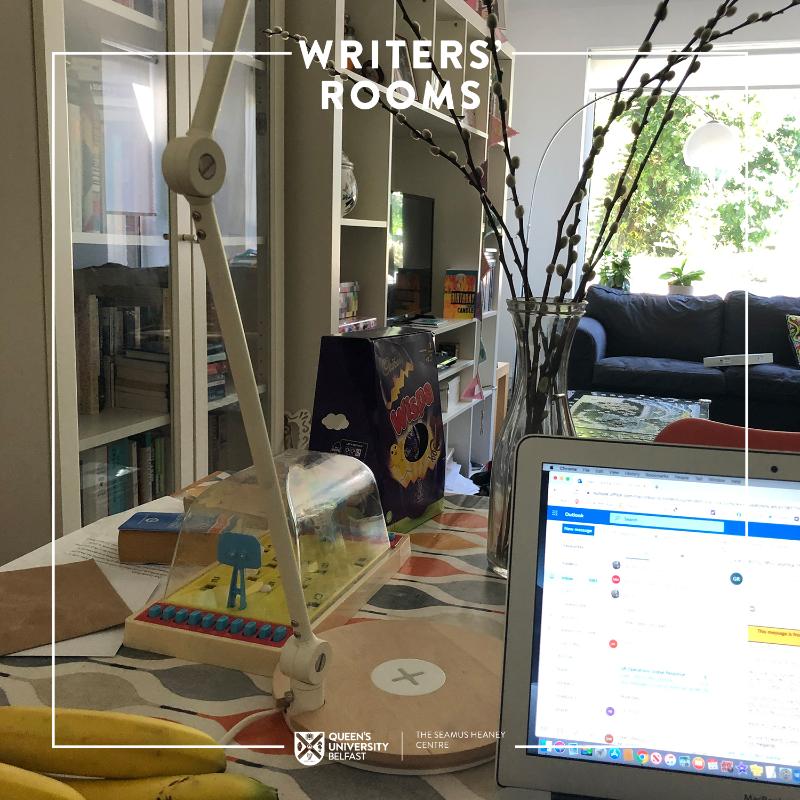
Poet, lecturer, and seasoned social-distancer Leontia Flynn invites us in to her writing space for drones, jigsaws, and table basketball.
Where are we?
At a table in my living room. I eat breakfast and sometimes use my laptop here – either to write emails or type things up. More often though I write (in my head) in bed or while walking about, but I’m not putting up a picture of my bedroom.
What are you working on?
I’ve been working on a new collection of poems for about three years under the working title Taking Liberties. I was thinking about isolation versus connection, dependence versus independence and ideas of freedom. Then this happened, and isolation got more real. I’m also always thinking around ideas for essays on poetry more generally, though this is still pretty vague.
What’s that over there?
There’s a game of table basketball beside my laptop which I bought three years ago in Lisbon which is surprisingly well engineered. Beyond the bananas and Easter egg on my desk you can see a 1000 piece jigsaw of The Great Wave by Katsushika Hokusai. Having done about two thirds of it over the last week, it now seems nearly impossible. I don’t know why I got it because I’m not even bored, and now I’ll have to finish it.
What’s that sound?
Silence. Time passing. Later I might play music – anything droney without words. In an hour or so there’ll be the sound of my daughter going ‘Mummy Mummy Mummy Mummy Mummy Mummy Mummy Mummy’
How does isolation help or hinder you?
It’s such a complicated thing. I think I maybe need more isolation than most people – lots of white space – but it has to be the right kind of isolation. In the past, I’ve been able to write with other people in the house as long as they are absolutely not bothering me. I hardly ever get actually lonely, but a sense that people are available in some capacity is useful. There’s a quote by, I think, Denise Riley that I’ve used often enough that I should check if it’s actually by her and these are actually the words, but I think it goes ‘You need to be alone to write. But not, you hope, insanely alone’.
Time for a break…?
I take breaks all the time. I can’t sit still for long. I’ll probably eat something awful. If I go near the jigsaw I’ll find myself accidentally doing it for the next six hours.
What are you reading/watching/listening to these days?
I keep reading Auden’s ‘The Fall of Rome’, and thinking about those final reindeer. Emily Dickinson seemed an obvious read for self-isolation too, and I’ve been more interested in her since finding myself teaching a class on her poetry last year when I visited the University of Heidelberg. I’m also reading The Lonely City by Olivia Laing. I don’t watch series on Netflix anymore because – like the jigsaw – I just find myself needing to finish them. My friend made a really good droney playlist recently that I listen to, and I made one of apocalyptic music. So funny.
What might you revisit in times of crisis or uncertainty?
I re-read The Plague by Camus at the beginning of the pandemic, and it’s very good on the sense exile and separation from normal life. Auden too probably – or anything from the ‘30s/’40s.
Best advice for writers?
Keep trying then try to keep going.
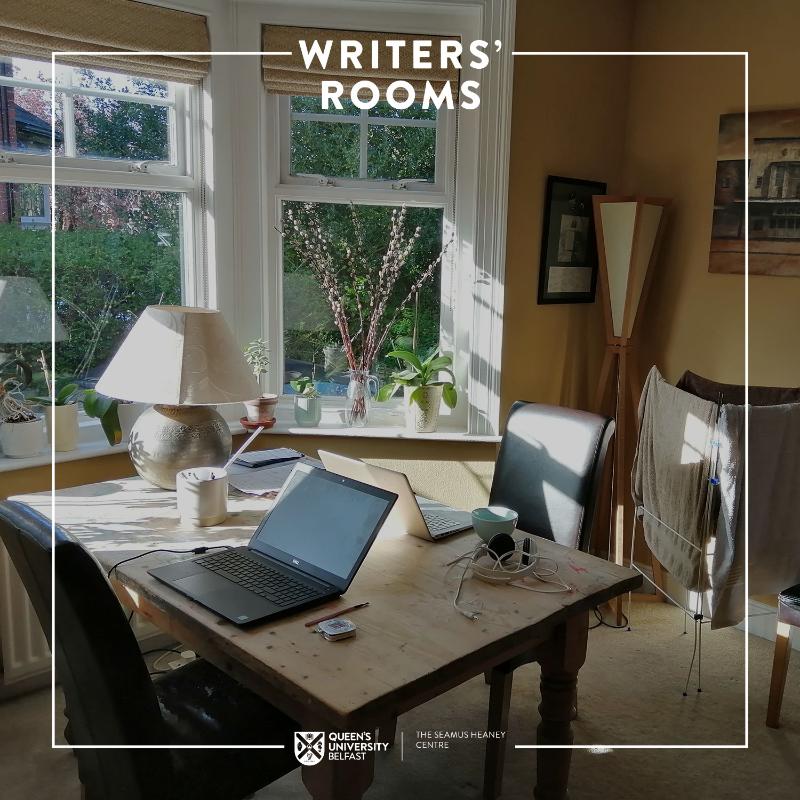
With his regular 'writing room' at Queen's out of bounds, screenwriter and lecturer in Creative Writing Tim Loane lets us into his temporary study, with Stiff Little FIngers, John Coltrane, Steely Dan, and the world's first female film director.
Where are we?
At the old table in the front room. My bespoke study while Queen’s is out of bounds. It’s not a bad room to work in. Has a big window and a view of the street. But it’s not designed to be shared with two others… my wife, a teacher and my son, a stressed-out law student.
What are you working on?
A new French TV series. It’s the story of Alice Guy, the woman who “invented” narrative film. She was a lowly secretary to Leon Gaumont, the only woman at the Lumiere brothers’ first demonstration of moving pictures in 1895. They were only interested in filming reality, but Alice persuaded Gaumont to lend her a camera over her lunchbreak and she made the world’s first ever movie. An extraordinary character, the world’s first female director, who went on to run her own studios in New York. She made a fortune, then lost it all, shot her husband and started sleeping with woman. Who can resist a story that juicy?
What’s that over there?
A framed copy of Stiff Little Fingers’ “Alternative Ulster”. It was an opening night gift from Tinderbox for my first theatre play, Caught Red Handed. One the few mementos of my work in our house. Oh yeah, my Oscar nomination certificate is on the other wall – to remind me that I’m a loser.
What’s that sound?
Steely Dan, right now for novelty. It was John Coltrane earlier. I nearly always listen to music when I’m working. Quality jazz is my writing music of choice. There’s something about the improvised nature of it that creates head-space. Helps me get into the zone.
How does isolation help or hinder you?
Hmmm. Bit of both. I’m used to working alone, obviously – but with three other adults in the house, I’m more easily distracted than usual. But then, while all filming has stopped world-wide, it means TV producers have nothing else to do except hassle poor writers – so the pressure is still on, thankfully, for now anyway…
Time for a break…?
I’m trying to stick to an exercise regime. My son, Matty has the kitchen laid out like a gym, and he takes no shit.
What are you reading/watching/listening to these days?
Re-reading “Chicago May” by Nuala O’Faolain. As research for the Alice project. It’s a beautiful book, exploring women’s lives at the turn of the century. Just finished “Hollywood Babylon”. Outrageous stuff. Sometimes I wish I could read just for pleasure, but there always seems to be a work reason to steer me as to what’s next.
I really enjoyed Unorthodox on Netflix. I love it when a drama shows a world that is totally new. Trying very hard to stick with The Americans on Amazon… but it’s losing me…
What might you revisit in times of crisis or uncertainty?
Re-watched Jean de Florette and Manon des Sources recently. Delightful. I’ve lost count how many times I’ve seen it. I started re-watching The Sopranos recently. Nothing can touch it. So good, it’s almost annoying.
Best advice for writers?
Stick to the schedule. And listen to people who know what they’re talking about. And regarding critics, fuck ‘em, what do they know?
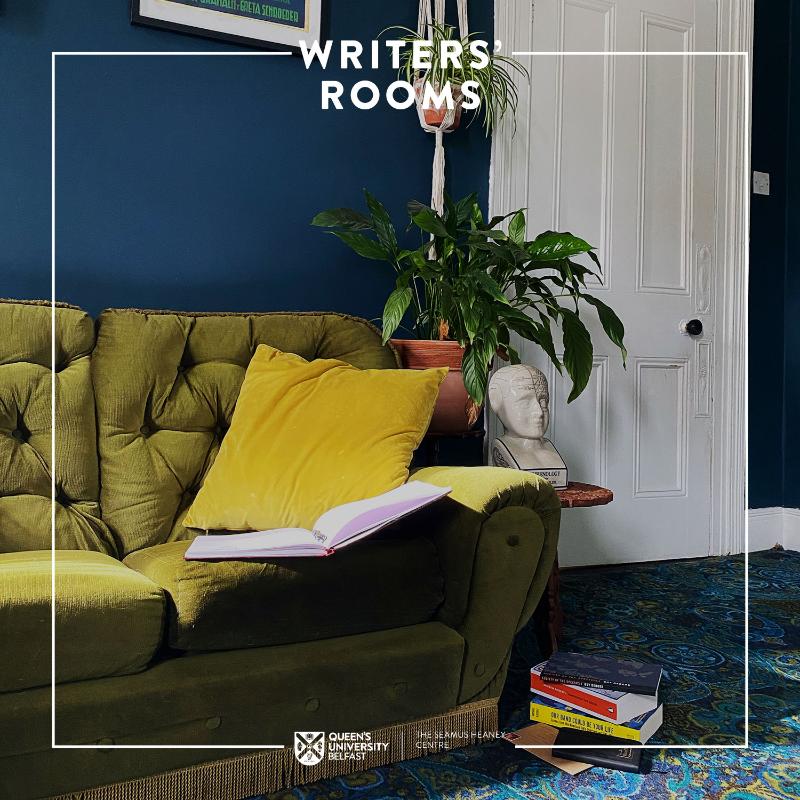
Screenwriter and lecturer in Creative Writing at the Seamus Heaney Centre, Aislinn Clarke invites us into her coastal writing room to talk about her latest projects, the importance of escapism, and the 19th century diorama that's letting her get away with it all. Possibly.
Where are we?
We have a study with a desk etc. but, truth be told, I do most of my writing here, where there is a fire and a sofa. A good 80% of script-writing is plotting, planning, and outlining. I do that by hand and, as this is the most painstaking and - not to sound overwrought - difficult part of the process, I like to be as comfortable as possible in every other way while I do it. Once I’ve got all that working properly, I’ll move into the study and start furiously typing it up - that’s the fun part.
What are you working on?
I’m juggling a few different scripts/treatments, but today I am working on a television treatment for a company based in Los Angeles. I was meant to be in Los Angeles this month, but alas that was not to be, so I’m doing the work from afar. Thankfully there is Zoom and that sort of thing nowadays.
What’s that over there?
In this room, I have an 19th century diorama of Christ on the cross that belonged to my great-great-grandparents - an inscription claims that it is worth 1000 indulgences. I’ll let you know how that works out.
What’s that sound?
Hmmm, now you mention it, I’m not sure. Hopefully nothing that requires a plumber or an exorcist.
How does isolation help or hinder you?
When I’m writing this is how I work anyway. I am hermetic when I’m in writing mode. My LA trip being delayed isn’t ideal, but is being rescheduled. A film I wrote was due to begin shooting next week and has obviously had to be postponed. Aside from that, there isn’t a great difference. The only thing I miss is walking my dogs somewhere beautiful, like the Mournes. I’m lucky to live on the coast, so I can go for scenic walks locally. I’m keenly aware that I’m very fortunate right now.
Time for a break…?
I have taken to gardening in the past year or so and I’ve been planting like crazy since the quarantine began. I’m not sure that I’m very good at it yet, but I do enjoy it. It’s either that or checking up on messages, Twitter, email or Skyping with a friend or family member.
What are you reading/watching/listening to these days?
News, news, and more news. Trying to cut back on that a bit! Music-wise right now I’m listening to Miles Davis (Bitches Brew). At night, I’m watching the second season of Barry and reading Motherwell by Deborah Orr.
What might you revisit in times of crisis or uncertainty?
Any Powell and Pressburger film - The Red Shoes, A Matter or Life and Death - is wonderful to watch when everything outside is less than wonderful. Pure escapism. Beautiful creations. I always find Mary Oliver very uplifting. Her poems radiate warmth and thoughtful kindness. With music, I jump from one thing to another. My most recent Spotify session included PJ Harvey, Bowie, R.E.M., Bauhaus, and This Mortal Coil.
Best advice for writers?
Keep writing.

Novelist and lecturer in Creative Writing at the Seamus Heaney Centre, Sam Thompson opens the door to his writing room and tells us of his forays into horticulture, his ever-deepening regard for primary school teachers, and striking a balance of tragedy and farce in challenging times.
Where are we?
Where else but at home for the foreseeable future!
What are you working on?
I’m working on a novel – though that makes it sound like a more orderly process than it is. What I really mean is that I’m working on getting a few decent sentences written today, and on not getting distracted by the ideas for other potential books that would be so much more fun to write; I’m working on not panicking about the fact that I’m too far into this book to give up, but not far enough to have the end in sight; and I’m working on not checking the news so often that it becomes damaging to mental health...
What’s that over there?
That over there is Sadhbh’s face peeping over the edge of the desk. She and her brothers are highly disciplined and will only interrupt me for the most pressing of reasons, like needing help with Minecraft or making sure I know they’re going for a wee.
What’s that sound?
Suky barking behind the house. She’s been in funny form these last couple of weeks – the humans are around all the time and she can tell something is up. She thinks she needs to protect us, but she doesn’t know what from. And that other sound is the ping of the timer on my phone, telling me the five-minute break is up and it’s time to write for 25 minutes without stopping.
How does isolation help or hinder you?
In my household we’ve been very lucky so far, and the biggest challenge of recent events has been the transition to home schooling. Isolation brings an ever-deepening admiration for the staff of Forge Integrated Primary School.
From talking to the writers studying at the Heaney Centre, I get the impression that, with life disrupted and the future uncertain, a lot of people have been thinking freshly about why they write, what their work does for them and what they hope it might do for other people. In writing as in other aspects of life we need to keep our resolve while also going a bit easy on ourselves. As Walter Benjamin says, ‘Nulla dies sine linea — but there may well be weeks’. Which I take to mean that we should ideally let no day go past without making a line, but we should also accept that there will be phases where it just doesn’t happen.
Or, for sterner advice on writing under difficult circumstances, I think of Zbigniew Herbert’s The Envoy of Mr. Cogito:
you were saved not in order to live
you have little time you must give testimony
Not very comforting, I suppose, but there’s something bracing in Herbert’s expression of a selfless courage that most of us, if our luck holds, will never be called on to display.
Time for a break…?
Usually I’d go for a run, but this week I’ve been digging up the back garden for a vegetable bed. I have zero experience or knowledge of horticulture, but somehow the idea of growing potatoes feels increasingly relevant.
What are you reading/watching/listening to these days?
I’ve just started reading E. H. Gombrich’s A Little History of the World, both to myself and to the children. It goes from the Stone Age to the atom bomb, and is a reassuring reminder of the depth of human time, the durability of human culture and the smallness of any given crisis, however desperate, in the scheme of things.
What might you revisit in times of crisis or uncertainty?
I do think tragedy gives solace, and the bleaker the better: I revisit King Lear or Beckett’s Endgame. On the other hand, sometimes when things seem dark and stressful I find the best thing to read is Carry On, Jeeves.
Best advice for writers?
Hang in there, like the cat poster says.
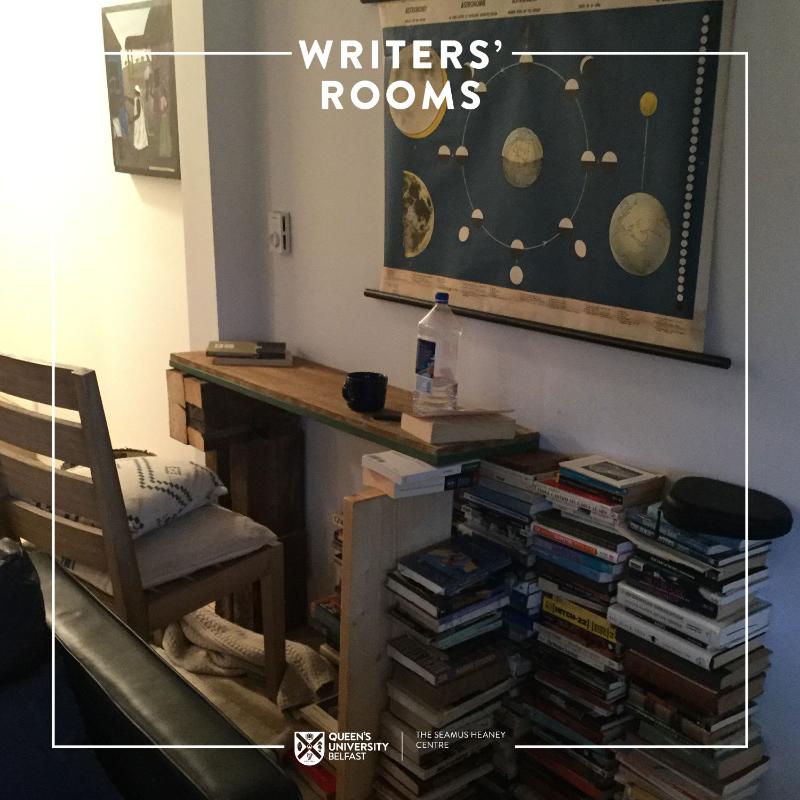
Poet, novelist, and Professor of Creative Writing at the Seamus Heaney Centre at Queen's, Nick Laird tells us where he's weathering the storm, and hints at a new career in furniture design, cosmic yoga, or making music videos for pugs.
Where are we?
I’m staying in a friend’s guesthouse outside a hamlet called Kerhonkson in Ulster County in New York state, at the foot of the Catskills. I left Manhattan last week with my family after spending a couple of weeks in lockdown in a small flat.
What are you working on?
I’m teaching, trying to write some poems, trying to write a book about poetry, a couple of screenplays, a review - also home schooling my kids, cooking, cleaning, washing… Last night my wife and I rewrote the lyrics to The Greatest Showman’s song, “This is me”, to be about our pug, Maud, and the kids and I are shooting a video for it on the iPad this afternoon.
What’s that over there?
That’s a table I’ve made from a plank of wood I found in a shed and some cut-up railway sleepers.
What’s that sound?
A red-winged blackbird attacking the feeder I hung on the tree outside. Or the Mombaccus creek which runs down at the end of the garden.
How does isolation help or hinder you?
If I get five minutes to myself I’ll let you know.
Time for a break…?
I do Cosmic Kids Yoga with my son and daughter. It’s on YouTube. They hate it.
What are you reading/watching/listening to these days?
I’ve been watching 40s movies. I watched The Grapes of Wrath last night, and the night before, Out of the Past. Also, a lot of news. I’ve been watching our President’s daily White House briefings which are like a horror clown doing show-and-tell. I finished the entire five seasons of Merlin with my kids, (which star the brilliant Colin Morgan from Dungannon). I’ve been listening to Fatoumata Diawara to work to (I need the words to be in a language I don’t speak) or brown noise (which is like white noise, but less harsh.)
What might you revisit in times of crisis or uncertainty?
Auden’s Gare du Midi for the present moment – something about the mouth / Distracts the stray look with alarm and pity. / Snow is falling. Clutching a little case, / He walks out briskly to infect a city / Whose terrible future may have just arrived. I’ve been reading Beckett’s Molloy, which has something of the confusion and despair and self-isolation in it we’ve all been feeling. And John Donne’s Devotions. Donne is maybe our greatest writer on illness.
Best advice for writers?
Keep ‘er lit.
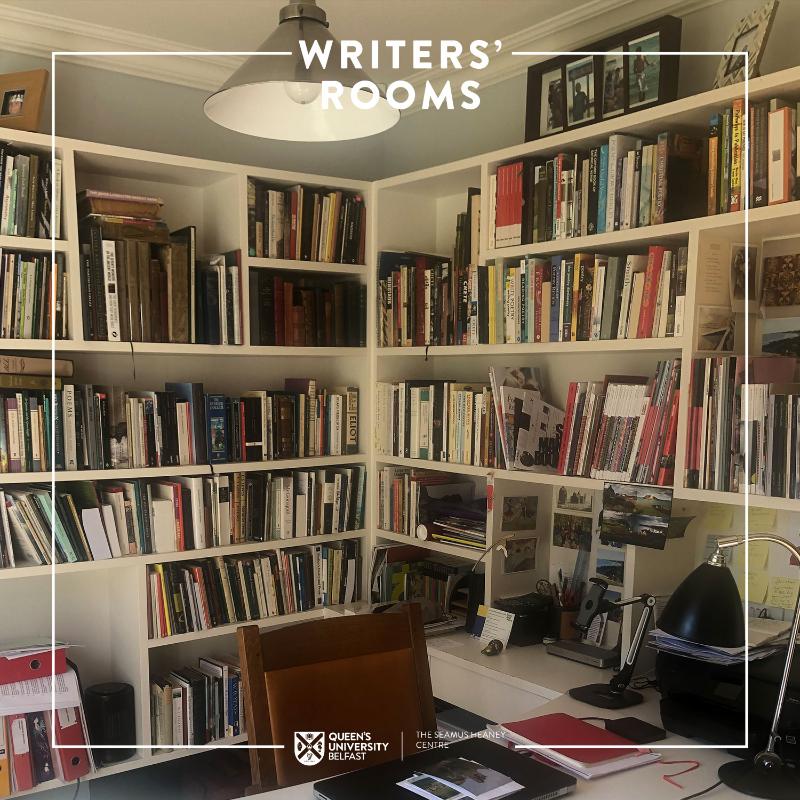
Since taking part in last year's Poetry Summer School, Estelle Price's work has been shortlisted for numerous prizes, and longlisted for the 2019 National Poetry Competition. Here, she introduces us to her writing room and some of the things in it, and talks of writing through fear.
Where are we?
I’m sitting in a swivel desk chair in my study with the patio doors flung wide listening to children playing over the fence and birds chatting in the yew tree. There are poetry books everywhere but I also have my Greek history library here. Lots of objects, that mean something to me, jostle on the shelves – a minotaur statue, a china beagle, a postcard of the Llyn Peninsula and photos, lots of photos. It’s not a big room but it’s mine and I am happy here.
What are you working on?
I intended to try and write a small series of poems to send to Poetry Wales. The focus of the next edition is Tryweryn and related themes, a valley that was flooded for a reservoir in the sixties in North Wales. I had the idea of a linked series of sonnets in the voice of the river, a protestor, one of the graves that was moved, a school child and the last bride to be married in the church. My mind has been so elsewhere that I’ve left it too late but I am still keen to write the poems. Aside from that I have been collating my poems into pamphlet/collection folders loosely by subject and have observed a house/home theme emerging. I am also continuing to work on a series of poems about the Bloomsbury Group.
What’s that over there?
A wooden hand with the little finger crooked, that needs dusting.
What’s that sound?
My husband and the green garden bin. He spends a lot of time with the green bin these days. Perhaps I should be worried.
How does isolation help or hinder you?
I like being on my own, in fact need to be on my own or I become unreasonable. So far though the coronavirus crisis has frozen me. I will soon be an expert in epidemiology. I need to start writing again, find a rhythm for fear.
Time for a break…?
Today I will prepare the seed trays. There will be cabbages, tomatoes, beans, lettuce, sweet peas and nicotiana in our garden this summer. I shall practice my wooden soprano recorder, play the piano, pick up and put down my tapestry. I will wonder if I have been transported back to the seventies but know I haven’t when I search in vain for an online food delivery.
What are you reading/watching/listening to these days?
We watched Eugene Onegin streamed live from the Met the other night. It was wonderful. We didn’t stay the course with Tristan and Isolde, a little too much bleak intensity. Some nights it’s just Last Tango in Halifax. I’m looking forward to the National Theatre Thursday night steaming of plays like Jane Eyre and One Man, Two Guvnors. I’m reading Ocean Vuong On Earth We’re Briefly Gorgeous for an online book group as well as working my way through The Craft edited by Rishi Dastidar. Jane Hirshfield’s Ledger is the next collection on my list.
What might you revisit in times of crisis or uncertainty?
The peace of wild things by Wendell Berry calms me. I might also lose myself in Trollope’s Barchester Tower novels (last read in my twenties on the way to work in Lincoln’s Inn) in the sure knowledge that the virus will have retreated by the time I get to the end of them.
Best advice for writers?
In this strangest of times listen for your inner voice, the one that walks towards the page with the words already in her pocket.

The novelist, screenwriter, and director of the Seamus Heaney Centre is the first to invite us into his writing room, where he tells us of the 'new thing', the machinations of his local birds, and the importance of looking out windows.
Where are we?
Behind the door at the end of the landing on the first-floor return, reminding myself at every moment (and twice as much this week as last) how fortunate I am to have a door at the end of the landing on the first-floor return with a room on the other side of it where I can sit and write this.
What are you working on?
The new thing. It came to me the last Friday in February. Well, it came to me on the Saturday that what came to me on Friday might be thing I was going to spend the next couple of years trying to work out how to write.
What’s that over there?
That? It’s a photo of the room I worked in when I was writing my fourth novel, The International. So, taken some time in the second half of the 1990s. I had started to strip the wallpaper, but never got around to finishing. (Writing novels can be hard, but it is nothing compared to stripping wallpaper.) The rest of the wall is covered with floor plans of the International Hotel, where the novel is set, and photographs of people attending functions there in the mid 1960s. I wanted one of the photos for the cover of the book, but it featured an aunt of the person who gave it to me (she looked like one of my aunts, that’s part of why I liked it), and he was worried, after he read the manuscript, that a couple of the passages would have had her turning in her grave. The thing next to that is a drawing my younger daughter did of me three summers ago at the gates of Strawberry Fields.
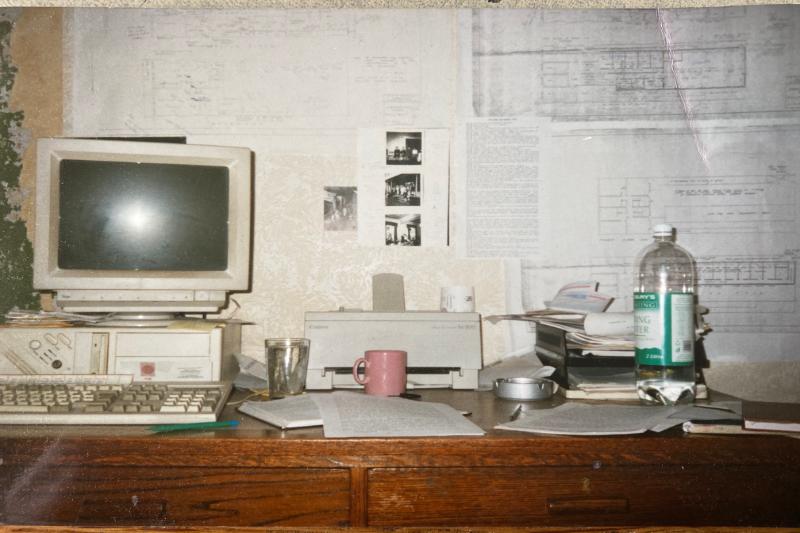
What’s that sound?
Undoubtedly a cat: feed me, let me out the window, let me in the window, look at how beautiful I am when I collapse sideways against your screen, look at how beautiful I am when I turn around and do with the other side.
How does isolation help or hinder you?
I think I sing less. I like it when there is someone to sing along with.
Time for a break…?
Replenish the birdfeeder and contemplate again the strange sequence of events that, the year before last, or the year before that, brought (in quick succession) a wren, a blackbird, and a thrush, in the door, against the window, and down the chimney. I wanted to tell them, go see a poet, get a whole poem to yourselves, all you are going to be is a sentence in my novel. I’ve noticed though they have begun to band together into a paragraph. I think they might be plotting a story.
What are you reading/watching/listening to these days?
I am starting my days with Ian Sansom’s Reading Room: A Year of Literary Curiosities, which is a frequent boon, even if the extract for today, 25 March, from FM Cornford’s Microcosmographia Academia: Being a Guide for the Young Politician, and headed ‘The Roar of the Ruthless Multitude’ (the multitude, that is, eager to get those ‘on the verge of old age – 50’ out of the way of their own progress), doesn’t cheer quite as much as some of the others. I am ending my days listening to MGMT’s Late Night Tales compilation (The Jacobites, ‘Hearts Are Like Flowers’, ‘Lord Can You Hear Me?’, Spacemen 3,and that’s only on Side D), bought from Strange Victory Records on Berry Street on a Saturday afternoon last June, before a Belfast Book Festival event, down the road from the Heaney Centre at the Crescent Arts Centre. It takes the place of prayer. That it all comes back, and soon.
What might you revisit in times of crisis or uncertainty?
I have been working on a film adaptation of Louis MacNeice’s Autumn Journal this past while. I go back time and time again to Canto IV: ‘there will always be people’. The only tattoo I would ever be tempted to get.
Best advice for writers?
Read the entry for 24 April in Reading Room (‘Describe an individual and you may end with a type; describe a type and you are likely to end with – nothing,’ F Scott Fitzgerald), and leave plenty of time for looking out the window.

Press play on the Writers' Rooms Recommends playlist, and imagine strolling down a long corridor taking in some very different soundtracks as you go. Sparks, Patsy Cline, Talking Heads, Fiona Apple, Grateful Dead, and lots of Miles Davis...
This project is just one of the ways we are attempting to mitigate isolation and anxiety amongst our students and staff during the COVID-19 pandemic. It is generously supported by the Queen's Annual Fund. Find out more about the wider project .

